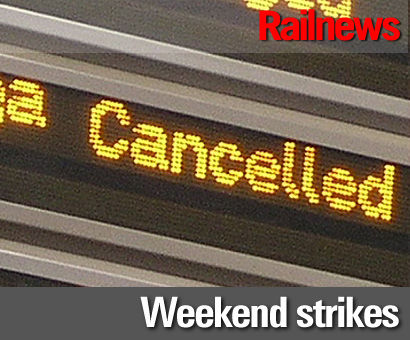UPDATED 8 April 2017 08.40
NEXT steps in the DCO dispute on Southern remain unclear, as the RMT stages its 31st strike on the network.
Talks took place between the RMT and Govia Thameslink Railway on Tuesday, but GTR would say only that ‘both sides are now considering their positions’. ASLEF, meanwhile, is also considering what to do next after its Southern members voted to reject a proposed DCO deal for a second time this week, in defiance of a recommendation from their union to accept it.
With no settlements in sight, the RMT is staging strikes on three networks – Merseyrail, Northern and Southern. The union is claiming that support from its members is ‘rock solid’.
The effects of these walkouts varies, but the disruption seems likely to be worse in the north of England. Merseyrail will concentrate on providing trains to Aintree for Grand National racegoers.
Northern expects to run about a third of its usual timetable, with bus replacements on some routes.
Southern is more optimistic and expects to run more than 90 per cent of its services. Southern passenger services director Angie Doll said: “We're now running a near-normal service on RMT strike days, so fewer people are being affected by the RMT’s action. This week, we plan to provide almost our entire normal Saturday timetable.”
The RMT has also clashed with the Office of Rail and Road this week, claiming that the latest list of DCO Principles published by HM chief inspector of railways Ian Prosser this week is a ‘politically motivated rehash’. The union is calling for an inquiry, and has also highlighted that the ORR has acknowledged a ‘significant knowledge gap’ in whether rail companies are meeting access and equality obligations for disabled passengers who wish to turn up and travel on DCO services without having to book assistance in advance.
The ORR replied: “ORR has much experience and expertise but like many organisations uses agencies to commission large scale research programmes. This allows us to build up a strong evidence base to help us prioritise and target regulatory interventions that may be necessary to improve the experience for passengers with disabilities.
“ORR is currently working with train companies across the network to examine the services they have in place for customers requiring assistance, and where necessary to drive improvements to disabled people’s protection policies. We are also carrying out research to get better evidence about the experience of passengers that pre-book passenger assistance and those that receive assistance without booking.”
(Note:— Until now Railnews has used the abbreviation ‘DOO’, for driver only operation. The industry now increasingly prefers the term ‘DCO’ – driver controlled operation. Our reports will reflect this from now on, using the term DCO whether a second member of staff, other than a traditional conductor/guard, is carried or not.)


